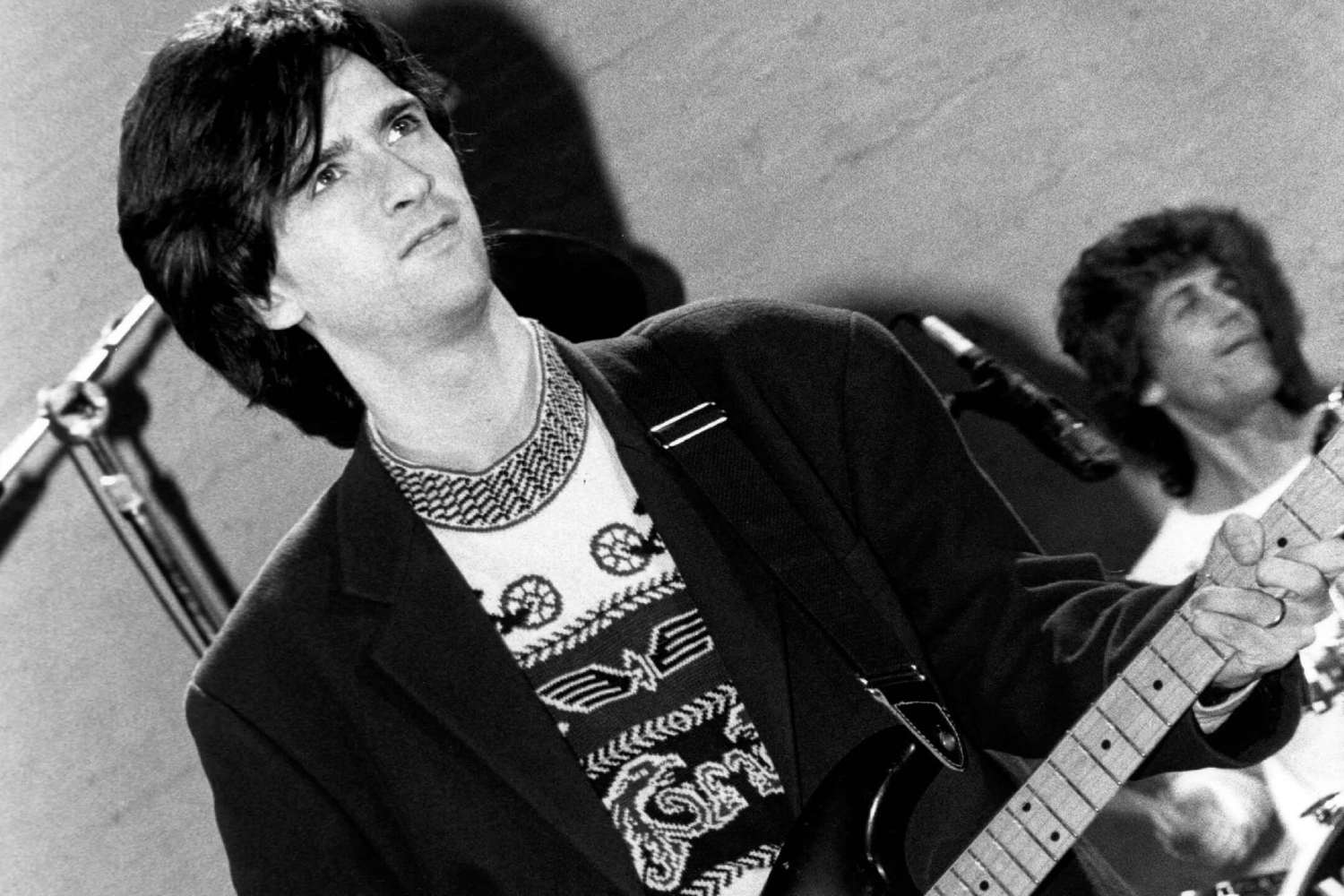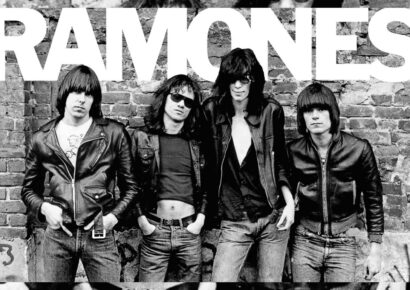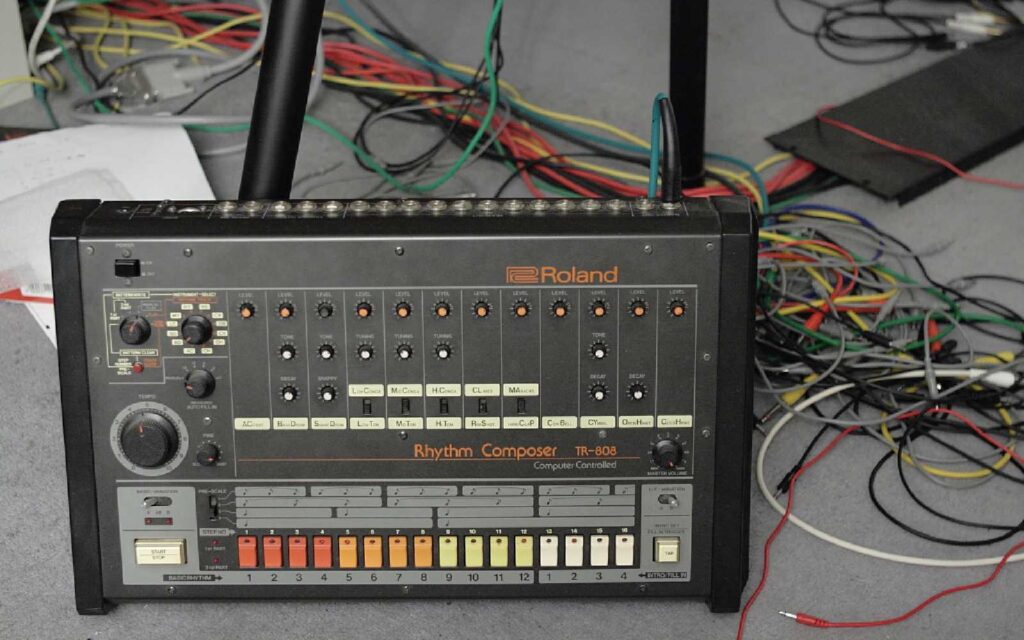Slap on your sunglasses, crank up your Fender Twin, and trek with us back to the '80s to explore the seminal riffs of Johnny Marr and The Smiths.
The storied career of the great Johnny Marr can’t be solely pinned down to his playing with The Smiths – he’s appeared on albums with New Order’s Bernard Sumner, guested on a number of Modest Mouse records in the 2000s, and has enjoyed quite a successful solo career in his own right. However, it’s with The Smiths where Johnny’s guitar playing made its biggest impact, and as such, that’s where we’re turning our attention to today.
Read up on all the latest features and columns here.
So, slap on your sunglasses, crank up your Fender Twin, and trek with us back to the ’80s to explore the seminal riffs of Johnny Marr and The Smiths.
‘The Headmaster Ritual’ – Meat Is Murder (1985)
At last year’s work break-up party, I remember having a conversation with a colleague, originally from Manchester. As he gleefully handed me a few cigarettes after learning of my Manchester United allegiance, the conversation soon turned to The Smiths. We discussed our favourite tracks, before he mentioned that he actually went to primary school with Johnny Marr and Andy Rourke. He then said something along the lines of: “You know the Headmaster from ‘The Headmaster Ritual’? He was the actual headmaster at our school.” Taken aback, I asked: “Was he really as bad as what Morrissey made him out to be?” to which he replied: “Yeah. He was a right c*nt.”
Being a song about a grotesque school principal, it’s only fitting that Marr would give us a pretty flagrant chord progression throughout the track. His guitar is tuned to E Major, which allows for a variety of suspended, extended chords that you’d typically find in jazz to percolate the jangly Smiths aura. The riff ensues, before Andy Rourke’s ferocious P-Bass barges its way into the mix with a genius countermelody.
‘Shoplifters of the World Unite’ – The World Won’t Listen (1987)
The Smiths adhered to somewhat of a ‘Dogme 95’ approach to their songwriting: no overdrive, no solos, and no layered vocals. ‘Shoplifters’ does everything in its might to not only break these rules, but defiantly burn the rulebook itself. Marr’s guitar sets up a persistent 16th note pattern, using some uncharacteristically hefty distortion, while Rourke mirrors this driving pattern on the bass. Morrissey’s vocals in the chorus are nicely layered, and for once, actually in tune. Marr then rips out a rare solo for the ages; it’s got melody, guts and is peppered with Gilmour-style harmonics.
‘How Soon is Now?’ – Hatful of Hollow (1984)
There aren’t many songs that are immediately recognisable within the first second of listening. But this one definitely is. Marr recalled that “I wanted an introduction that was almost as potent as ‘Layla’… when it plays at a pub or a club, everyone knows what it is.” Marr recorded the unmistakeable warbling guitar part on an Epiphone Casino going through a Fender Twin Reverb, first without the vibrato effect.
Marr and producer Stephen Street then applied the vibrato to the track, using another Fender Twin. “We had to keep all the amps vibrating in time to the track and each other, so we had to keep stopping and starting, recording in ten second bursts.” It’s pretty remarkable to think that what started out as a hotboxed studio jam eventually went on to become one of the signature tracks of the ‘80s. However, it’s inconceivable to think that this would have been the case were it not for the creative panache of Johnny Marr.
‘Heaven Knows I’m Miserable Now’ – Hatful of Hollow (1984)
No guitarist – with the exception of Jimmy Page – could get four guitar layers to lock together as well as Johnny Marr, and it’s this single that best exemplifies his adeptness as an arranger. The track starts with some sparse, whammy-infused chords, before gaining traction as Morrissey’s typically dreary vocals come in. Marr then incorporates some funkily glossy rhythmic work, reminiscent of his idol Nile Rodgers.
While Morrissey moans about looking for a job then finding one, it’s clear that Marr is working numerous jobs at once. His playing gradually becomes busier, with some melodic yet unobtrusive lines that highlight a special penchant in crafting the perfect guitar accompaniment. All the while, Marr’s melodicism is reciprocated in Andy Rourke’s phenomenal bass part, whose extensive use of tenth chords fills out the lush harmonic textures set up by the guitarist.
‘Cemetry Gates’ – The Queen Is Dead (1986)
The most brilliant thing about The Smiths was their ability to create a world within which their music exists. No other song, in my opinion, showcases this better than ‘Cemetry Gates’, from their timeless 1986 LP The Queen Is Dead. I would say that this is probably the brightest moment on the album, largely thanks to Johnny Marr’s ingenious choice of chords, as well as his layering arrangements. The guitar craftsman mainly relies on a few Major chords to give this song its sparkly vibe; this sonic shimmer is extended by the guitars on which these chords are played.
As the song progresses, Marr lays down a handful of acoustic and electric layers that gradually grow in texture. This unique talent ultimately defines the guitarist’s status as one of the cleverest proponents of the instrument.
Watch Johnny Marr play through classic Smiths riffs in this Ernie Ball String Theory episode.







